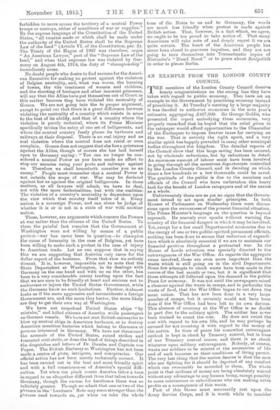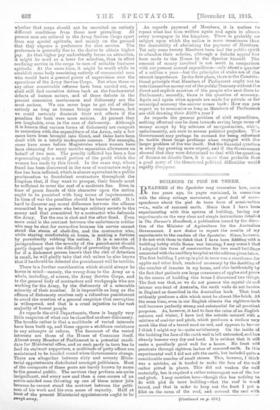AN EXAMPLE FROM THE LONDON COUNTY COUNCIL. T HE members of
the London County Council deserve hearty congratulations on the strong line they have taken with regard to public economy.. They have set an example to the Government by practising economy instead of preaching it. At Tuesday's meeting by a large majority it was decided to authorize economies in the next year's estimates aggregating £407,000. Sir George Goldie, who presented the report embodying these economies, very properly remarked that he hoped that the relief given to the ratepayer would afford opportunities to the Chancellor of the Exchequer to impose heavier taxes for carrying on the war. That is entirely the right spirit, and a very similar spirit has happily prevailed in many other municipal bodies throughout the kingdom. The detailed reports of the Council show that this large saving has been secured, not by wholesale reductions, but by reductions in detail. An enormous amount of labour must have been involved in going through all the numerous departments controlled by the London County Council, and in deciding on which items a few hundreds or a few thousands could be saved. The gratitude of the public is due to the members and officials of the Council who have undertaken this heavy task for the benefit of London ratepayers and of the nation as a whole.
Unfortunately there are as yet no signs that the Govern- ment intend to act upon similar principles. In both Houses of Parliament on Wednesday there were discus- sions upon the seriousness of the present financial situation. The Prime Minister's language on the question is beyond reproach. He scarcely ever speaks without warning the country of the financial dangers in which it may be involved. Yet, except for a few small Departmental economies due to the energy of one or two public-spirited permanent officials, nothing bas been done to secure that reduction of expendi- ture which is absolutely essential if we are to maintain our financial position throughout a protracted war. In the House of Lords attention was specially directed to the extravagances of the War Office. As regards the aggregate sums involved, these are even more important than the waste which is still going on in the civil Departmeuts. Some few attempts to check waste have been made in the course of the last mouth or two, but it is significant that those attempts all followed upon the demand in the public Press for economy. It was not until the newspapers raised a clamour against the waste in camps, and iu particular the waste of food, that the War Office began to cut down the meat ration. That has now been dune in a very large number of camps, but it certainly would not have been done if the War Office had been left to its own devices. This absence of economy at the War Office is no doubt in part due to the military spirit. The soldier has never been trained to count the cost. Ile does not count the cost with regard to his own life, and he may perhaps be excused for not counting it with regard to the money of the nation. In time of peace his somewhat extravagant outlook is kept in check by Treasury control, but in time of war Treasury control ceases, and there is no check whatever upon military extravagance. Nobody, of course, wauts our soldiers to be stinted of the necessaries of life and of such luxuries as their conditions of living permit. The very last thing that the nation desires is that the men who are fighting for it should be deprived of any comfort which can reasonably be accorded to them. The whole point is that millions of money are being absolutely wasted without any advantage to any human being, except possibly to some contractors or subordinates who are making extra profits as a consequence of this waste. Part of this blame must necessarily rest upon the 'Army Service Corps, and it is worth while to consider whether that corps should not be recruited on entirely different conditions from those now prevailing. At present men are enlisted in the Army Service Corps apart from any special aptitude, end mainly on the ground that they express a preference for that service. The preference is generally due to the desire to obtain higher pay. As that higher pay undoubtedly forms an attraction, it might be used as a lever for selection, thus in effect confining service in the corps to men of suitable business aptitude. At the same time, it might be worth while to establish some body consisting entirely of commercial men who would have a general power of supervision over the operations of the Army Service Corps. But when these or any other conceivable reforms have been carried out, we shall still find ourselves driven back on the fundamental defects of human nature, and of these defects in the present connexion carelessness and dishonesty are the most serious. We can never hope to; get rid, of either entirely as long as human beings remain human, but we could. certainly diminish their evil effects; if the' penalties for both were more serious. At present they are laughable, even in the case of diehonesty. Althongh• it is known that various forms of dishonesty are rampant. in connexion with, the expenditure of the Army, only a few cases have been brought into Court, awl these have been. dealt with in a totally inadequate manner. For example„ cases have come before Magistrates where women, have been obtaining for many months separation allowances on behalf of two men. The penalty inflicted+ has been a tine representing only a. small portion of the profit which: the woman has made by this. fraud. In the same way, where fraud has been discovered in the case of contractors only a fine has been inflicted, which is almost, equivalent to a public' proclamation to fraudulent contractors throughout the kingdom that, if they want to prosper, their frauds' must be suffieient to cover the cost of a moderate fine. Even in time of peace frauds of this charecter upon the nation ought to be punished with long terms of imprisonment. In time of war the penalties should be heavier still. It, is bard to discover any moral difference between the offence, committed by a person who betrays military secrets to the enemy and that, committed by a. contractor who defrauds the Army. Yet the one is shot and the other fined. Even more cruel is the contrast between, the unfortunate soldier who may be shot for cowardice because, his nerves cannot stand the strain of shell-fire, and the contractor who, while staying comfortably at home, is making a fortune by persistently robbing the nation. It is a. maxim of jurisprudence that the severity of the punishment should partly depend upon the difficulty of preventing the offence, for if a dishonest person knows that the risk of detection is small, he will gladly take, that risk unless he also knows that if he should be detected the punishment will be. terrible.
There is, a further consideration which should always' be. borne in mind—namely, the wrong done to the Army as' a whole, including, of course, the Army Service Corps+, and to the general body of contractors and workpeople who are working for the Army, by the dishonesty of a miserable minority of their number. It is impossible as long as the offence of dishonesty receives only a ridiculous punishment to avoid. the creation of a general suspicion that corruption is widespread, and that is a cruel injustice' to the vast majority of honest people. As regards the civil Departments, there is happily very little suspicion of what can beelasmified as sheer dishonesty. The trouble rather is that a multitude' of vested interests have been built up, and these oppose a stubborn resistance to any attempts at reform. The foremost of the vested interests are those of the House of Commons itself. Almost every Member' of Parliament its a potential candi- date for. Ministerial office, and as each party in turn has to feed its stalwart supporters, a multitude of petty offices are maintained to be handed round when Governments change. There are altogether between sixty and seventy Minis.. terial appointments distributed amongst politicians. Most of the occupants of these posts are barely known by name to the general public. The services, they perform, are quite Insignificant, and every now and then+ a case occurs of an active-minded man throwing up one of these. minor jobs because be cannot stand. the contrast between the petti- ness of his work and his own sense of capacity. Half at least of the present Ministerial appointments ought to bo swept away. As regard's payment of Members, it is melees toe repeat what has been written again. and again in almost: every newspaper' in the kingdom. There is probably en subject upon which the nation is' more uneatimetia than. the desirability of abolishing the payment of Merebere. Yet only some twenty Members have bed the public, apirita to abandon their salaries, although a definite appeal lae been made to the House by the Speaher himself. The amount of money iuvolved is not much in comparison, with our present annual expenditure—only about a quarter of a million a year—but the principles at stake. are of the, utmost importance, In the first place, there is the Constitu- tional principle that Members of Parliament ought not tea vote themselves-money out of the public:Treasury without they direct and explicit sanction of the people who sent, them to Perlisment t. secondly, there' is the question of economy.. Again and again when appeals are made forprivate, or for muuicipai economy the answer mites back How can yea expect us to economize as as Members of Perliamen.b are still drawing their £4001 a year ?
As regards the general problem of civil expenditure, nothing effectual can be dorm towards saving large. stune eve money except by big schemes of reorganization,. whine unfortunately,. are sure to arouse, political preitadlices The: Government may perhaps be excused for being reductane to Mettle these large problouas when, engaged with tire larger problem of Chewer itself. But the financial questioa is every day growing, mere urgent, and if the. Government; showed that they were determined to, deal with the. questiom of finance on drastic linen. it is mere than probable that a good. many of the threatened. political difficulties would{ rapidly d i's,rrp ea te







































 Previous page
Previous page